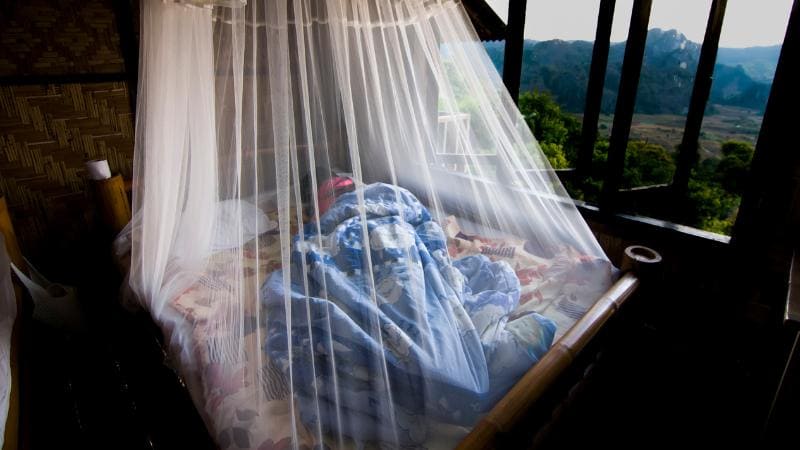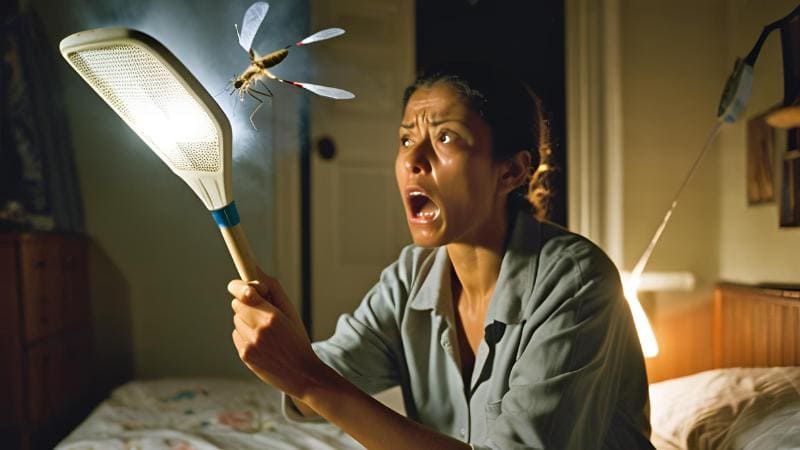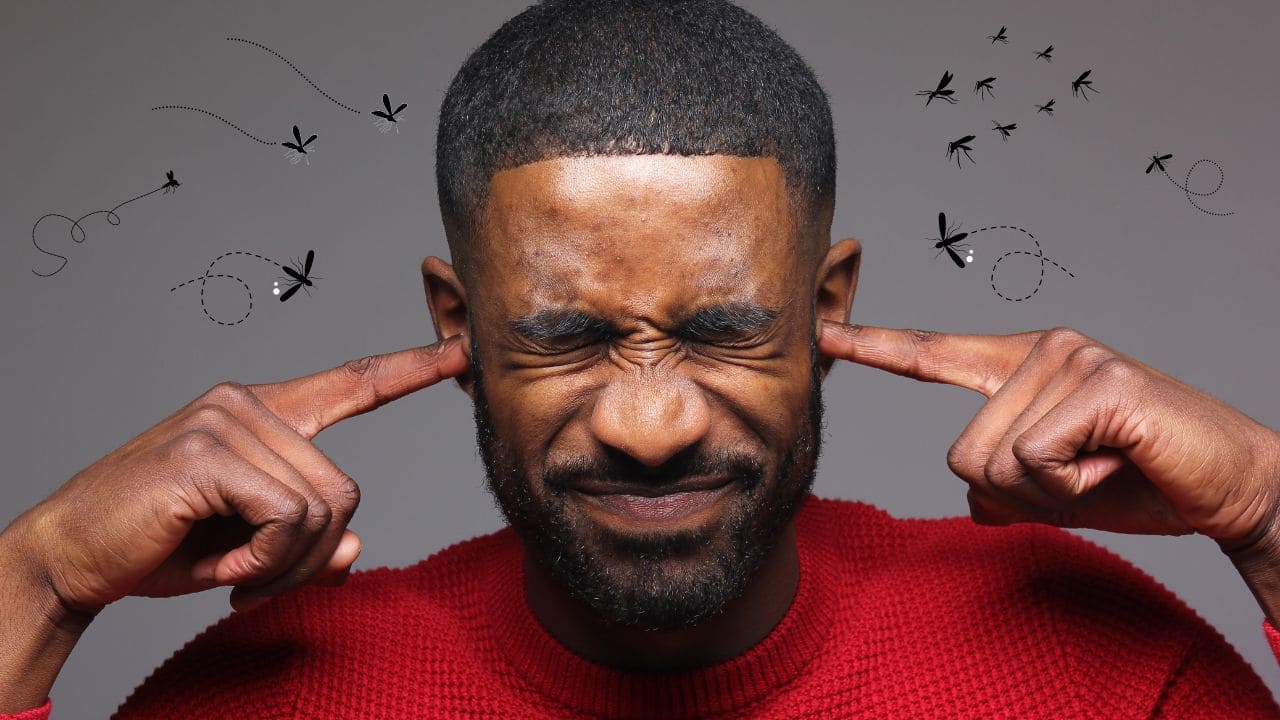Do really mosquitoes buzz in peoples ears?
Not actually, they mostly buzz around the head region and around the neck which are the two main sweating points of the human body. All humans perspire and releases sweat, which attracts mosquitoes around them.
Since our ears are located in this region, it often seems like the buzzing is right next to us. Additionally, our ears are the only part of our body that can perceive sound, which makes the buzzing even more noticeable. So, although they may not actually fly directly into your ear, they are definitely close enough to be heard.
Why do mosquitoes buzz in people’s ears?
How many of you have ever thought why mosquitoes buzzing around their ear? That tremulous sound is produced by their special structure actually. Mosquitoes have particular organs serving as their eye which enables them to locate the areas occupied by human beings.
As they fly, their fast-flapping wings produce the buzzing sound. This sound is obviously loud at the time they third fly around or hovering around our ear. What’s fascinating about this is that it isn’t just a sound. It is, in fact, a sound that helps them in locating us. They tend to breathe out carbon dioxide and heat from their bodies which the buzz assists them in doing so.
The next time you hear that irritating buzzing sound remember to include in it the fact that it, for the mosquito, is a sign for them to feast on you.
The following are some of the reasons why actually mosquitoes buzz:
1. Mosquitoes attraction to human body odor and carbon dioxide
Carbon dioxide is the main source of attraction that we exhale while breathing. When we exhale the carbon dioxide it forms a cloud and spread to a long distance and the mosquitoes with their special receptors called maxillary palps, quickly scan any variation in carbon dioxide levels in the air.
This is how they find a trail of human presence through special senses and locate their hosts. After sensing they locate and approach the hosts and start hovering around their head.
The mosquitoes are also attracted towards other emissions from human bodies like lactic acid, body heat and body odor, when they perspire or sweat. As they have highly evolved sensory systems with antennae equipped with olfactory receptors, they can easily detect carbon dioxide, body heat, body odor and other chemical emissions.
These emissions along with carbon dioxide acts as sensory signals and attracts mosquitoes around our head which becomes the prime target. We have written a detailed article on – What foods to eat to keep mosquitoes away, must read for you.
And therefore, we feel that mosquitoes are buzzing around our ears, but actually they target all body parts that have skin exposed like our head, hands and forearms, legs, etc.

Image Credit: Canva Pro | Content License
2. Extremely high wingbeat frequency
The mosquitoes are known for their quick and active reflexes, along with stationary flights which is mainly due to its unusual flight behavior and aerodynamic features. The mosquitoes generally flap their wings back and forth at a frequency of around 800 beats per second (300 to 600 beats per second for female mosquitoes and up to 1000 beats per second for male mosquitoes).
This extreme wingbeat frequency creates a buzzing noise from mosquitoes. Which gets amplified when they are closed to our ears specially in quiet rooms and spaces, while hovering around our head looking for an opportunity to land and bite for a blood meal. The region where they hover is a sensitive area from where our ears can pick up sound more quickly.
3. Mosquito mating behavior
The female mosquitoes are responsible for biting humans while the male mosquitoes are harmless, they do not need blood meals. Now, these female mosquitoes use their wingbeats to communicate with male mosquitoes for mating.
The male mosquitoes than try to match their own wing beat frequency with the potential mating partner, which is called harmonic convergence where male mosquitoes locate female ones for mating.
This is also another reason why we hear buzzing sound. And since the female mosquitoes hover near their human target proximity, they invite male mosquitoes through wing beats.
4. Gender specific
The sounds of wing beat from female mosquitoes has higher pitch, as compared to male mosquitoes which although has even higher wing beat frequency. This mainly because they want to communicate with potential male partners for mating.
And since they prefer to be around the human proximity for attempting bite, the female mosquitoes never leave human surrounding. While the male mosquitoes which feeds mainly on nectar and plant juices, they do not need to target or approach humans.
How do I stop mosquitoes from buzzing in my ears
The following methods and techniques are effective in keeping mosquitoes away:
1. Use mosquito repellents
Mosquito repellents creates a barrier and also interferes with the smelling sense of mosquitoes. These commercials mosquito repellents are available in different forms like:
- lotions, creams or ointments,
- mosquito repellent sprays,
- anti-mosquito coils or sticks,
- liquid for diffusers,
These are all made using DEET, picaridin, pyrethrin, etc. along with many natural essential oil based ingredients.
2. Protective clothing and gears
Whenever you are going outdoors especially in mosquito laden areas, you should wear protective clothing like mosquito repelling jackets, head nets, anti-mosquito bracelets, etc. Mosquito repellent treated protective clothing are advance functional clothing to keep mosquitoes at bay.
3. Use mosquito nets
Mosquito nets can be used on beds, patios, porches, doors and windows, as balcony sliding nets, as ‘hammocks with mosquito nets’ for use while camping outside, etc.
The mosquito nets are most preferred even when spending time indoors as well as outdoors. It’s a natural and non-toxic solution against mosquitoes. The net promotes fresh air circulation and prevents mosquitoes.
There are no chemical vapors which harms the babies. No use of essential oils that are potentially dangerous for your pet cats and dogs. It improves quality of sleep without any disturbance.
Therefore, using mosquito nets is more convenient, cost-effective and reliable method for keeping mosquitoes at bay.

Image Credit: Canva Pro | Content License
4. Wear light colored clothing
It is said that mosquitoes are attracted to dark colors. Dark colored clothes especially navy, maroon and black, traps heat released from our body and makes us to sweat more. This increases the amount of body heat, body odor and carbon dioxide levels around us and is easily detectable by mosquitoes.
Always wear light colored clothes specially in evening or night time to avoid attracting mosquitoes to some extent.
5. Use essential oil in diffusers
We can use essential herbs and oils like citronella/lemongrass, eucalyptus, lavender, tea tree, etc. It is a chemical free method of repelling the mosquitoes. Can be used about 5 drops an essential oil in a diffuser to repel the mosquitoes for 3 to 4 hrs.
6. Grow mosquito repellent plants
There are indoor mosquito repellent plants that can be placed or hanged inside the rooms, near balconies, doorways and outdoor spaces to restrict entry of mosquitoes inside your home.
Not completely reliable but a natural way of repelling mosquitoes that also improves the aesthetics of your rooms and walls, along with pleasant smell.
7. Install high speed fans
Mosquitoes are very weak and tiny insects, that can be easily blow away with the help of strong currents of air. Install high speed fans which will make them difficult to navigate around and will disrupt their flight patterns.
Also, the carbon dioxide levels, human body heat and odor emissions will be deflected and dispersed which will be difficult for mosquitoes to detect and locate their hosts.
8. Use mosquito bats, mosquito traps, ultrasound repellers, zappers etc.
You can use advance repellers and traps that are chemical free and cost effective. They are not completely reliable but reduce the number of mosquitoes to a great extent without any efforts.

Image Credit: Canva Pro | Content License
- For small rooms with closed doors and windows, you can use small equipment like a mosquito bat or a zapper that kills mosquitoes instantly.
- There are DIY homemade mosquito traps which uses sugar, with baking soda and vinegar which reacts and releases carbon dioxide to attract mosquitoes. Some homemade traps uses sugar and yeast which also releases carbon dioxide. These are not that effective and reliable and requires extra efforts.
- There are vacuum based mosquito traps which sucks mosquitoes, and also there are UV based zappers, all are commercially available and effective to great extent.
Why there is more mosquito buzzing in ear at night?
Have you ever wondered, why do mosquitoes buzz in our ears in the night? Mosquitoes are crepuscular insects, which means they are active from evening till morning or from dusk till dawn. These crepuscular nature of mosquitoes makes them highly active in evening and night times.
Also, they are physically not strong enough to withstand day light. They get dehydrated and die if they spend sufficiently longer time in hot sunlight. They cannot withstand dry humid climates during day time.
Therefore, they hide themselves in moist and dark areas like dense vegetation, garage, border areas of a pond, tree holes, bathroom and toilets, etc. and become active at night. The peak activity starts from early evening hours when they start the struggle to find blood meals.
Frequently Asked Questions (FAQs)
-
How do I stop mosquitoes from buzzing in my ears at night?
Place mosquito nets over beds, apply mosquito repellent lotions or creams, light mosquito coils or incense sticks, keep natural mosquito repellent flowers in your bedroom, and so forth. These are some of the measures to prevent mosquitoes from buzzing in your ears at night.
-
What attracts mosquitoes to the ear?
It would be the heat emitted from the body in addition to body odor and some chemical emissions, the main contributor being carbon dioxide which we exhale when breathing. These factors may draw mosquitoes 50 meters away.
-
Do female mosquitoes buzz?
Both male and female mosquitoes create the buzzing sound, which is mainly due to their extreme wing beat frequency. However the female mosquitoes have a higher pitch and louder sound than female mosquitoes. And only the female mosquitoes approach humans for blood meals, we hear female mosquitoes buzz only. The male mosquitoes do not harm humans as they feed mainly on nectar and plant sources.

